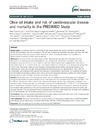Please use this identifier to cite or link to this item:
https://accedacris.ulpgc.es/jspui/handle/10553/18033
| Title: | Olive oil intake and risk of cardiovascular diseaseand mortality in the PREDIMED Study | Authors: | Guasch-Ferré, Marta Hu, Frank B. Martínez-González, Miguel Ángel Fitó, Montserrat Bulló, Mónica Estruch, Ramón Ros, Emilio Corella, Dolores Recondo, Javier Gómez-Gracia, Enrique Fiol, Miquel Lapetra, José Serra-Majem, Luis Muñoz, Miguel-Angel Pintó, Xavier Lamuela-Raventós, Rosa Maria Basora, Josep Buil-Cosiales, Pilar Sorlí, José V. Ruiz-Gutiérrez, V. Martínez, J. Alfredo Salas-Salvadó, Jordi |
UNESCO Clasification: | 3206 Ciencias de la nutrición | Keywords: | Mediterranean Diet Olive oil Cardiovascular Mortality PREDIMED |
Issue Date: | 2014 | Journal: | BMC Medicine | Abstract: | Background: It is unknown whether individuals at high cardiovascular risk sustain a benefit in cardiovascular disease from increased olive oil consumption. The aim was to assess the association between total olive oil intake, its varieties (extra virgin and common olive oil) and the risk of cardiovascular disease and mortality in a Mediterranean population at high cardiovascular risk.Methods: We included 7,216 men and women at high cardiovascular risk, aged 55 to 80 years, from the PREvención con DIeta MEDiterránea (PREDIMED) study, a multicenter, randomized, controlled, clinical trial. Participants were randomized to one of three interventions: Mediterranean Diets supplemented with nuts or extra-virgin olive oil, or a control low-fat diet. The present analysis was conducted as an observational prospective cohort study. The median follow-up was 4.8 years. Cardiovascular disease (stroke, myocardial infarction and cardiovascular death) and mortality were ascertained by medical records and National Death Index. Olive oil consumption was evaluated with validated food frequency questionnaires. Multivariate Cox proportional hazards and generalized estimating equations were used to assess the association between baseline and yearly repeated measurements of olive oil intake, cardiovascular disease and mortality.Results: During follow-up, 277 cardiovascular events and 323 deaths occurred. Participants in the highest energy-adjusted tertile of baseline total olive oil and extra-virgin olive oil consumption had 35% (HR: 0.65; 95% CI: 0.47 to 0.89) and 39% (HR: 0.61; 95% CI: 0.44 to 0.85) cardiovascular disease risk reduction, respectively, compared to the reference. Higher baseline total olive oil consumption was associated with 48% (HR: 0.52; 95% CI: 0.29 to 0.93) reduced risk of cardiovascular mortality. For each 10 g/d increase in extra-virgin olive oil consumption, cardiovascular disease and mortality risk decreased by 10% and 7%, respectively. No significant associations were found for cancer and all-cause mortality. The associations between cardiovascular events and extra virgin olive oil intake were significant in the Mediterranean diet intervention groups and not in the control group.Conclusions: Olive oil consumption, specifically the extra-virgin variety, is associated with reduced risks of cardiovascular disease and mortality in individuals at high cardiovascular risk. | URI: | https://accedacris.ulpgc.es/handle/10553/18033 | ISSN: | 1741-7015 | DOI: | 10.1186/1741-7015-12-78 | Source: | BMC Medicine [EISSN 1741-7015], v. 12 (1), e78, (Mayo 2014) | Rights: | by-nc-nd |
| Appears in Collections: | Artículos |
SCOPUSTM
Citations
298
checked on Jun 8, 2025
WEB OF SCIENCETM
Citations
281
checked on Jan 25, 2026
Page view(s) 10
202
checked on Jan 15, 2026
Download(s)
293
checked on Jan 15, 2026
Google ScholarTM
Check
Altmetric
Share
Export metadata
Items in accedaCRIS are protected by copyright, with all rights reserved, unless otherwise indicated.
